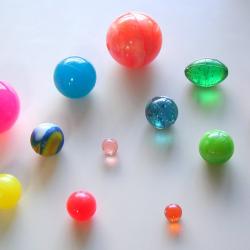Source Institutions
Source Institutions
Add to list Go to activity
Activity link broken? See if it's at the internet archive

In this activity, learners predict whether a ball on Earth or a ball on the Moon bounces higher when dropped and why. They simulate the experiment by dropping high- and regular-bounce balls from their shoulder height. Learners discover that in microgravity, a little energy goes a long way! This activity station is part of a sequence of stations that can be set up to help learners explore how space affects the human body and why.
- Under 5 minutes
- 10 to 30 minutes
- $1 - $5 per group of students
- Ages 8 - 14
- Activity, Lesson/Lesson Plan
- English
Quick Guide
Materials List (per group of students)
- 1 high-bounce ball
- 1 jacks ball or other low-bounce ball
- 1 permanent marker
- Learner's guide
Subjects
-
Earth and Space Science
- Astronomy
- Earth Structure
-
Solar System
- The Moon
-
Life Sciences
-
Human Body
- Muscles and Skin
- Health and Nutrition
-
Human Body
-
Physical Sciences
-
Energy
- Potential and Kinetic Energy
- Energy and Power
- Work and Machines
-
Motion and Forces
- Gravity
-
Structure and Properties of Matter
- Mass and Weight
-
Energy
-
The Nature of Science
-
The Scientific Process
- Conducting Investigations
- Science as a Career
-
The Scientific Process
Informal Categories
- Sports and Exercise
- Toys
Audience
To use this activity, learners need to:
- see
- read
- be mobile
- touch
Learning styles supported:
- Involves hands-on or lab activities
Other
Components that are part of this resource:
Includes alignment to state and/or national standards:
This resource is part of:
- Lunar and Planetary Institute Educator Resources
- Explore! Health in Space
- Space Stations - Living and Working in Space (activity series)
Access Rights:
- Free access
By:
- Department of Education and Public Outreach, Lunar and Planetary Institute; Byerly, Dr. Diane
Rights:
- All rights reserved, Lunar and Planetary Institute, 2006
Funding Source:
- NASA's Exploration Systems Mission Directorate's Education Program
